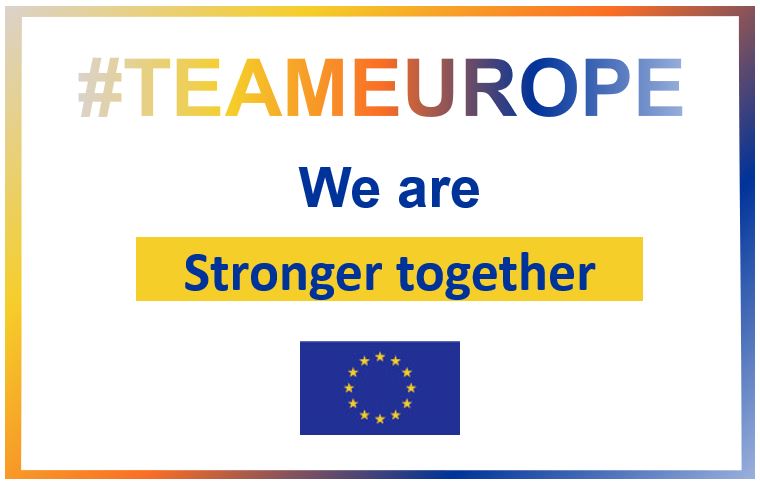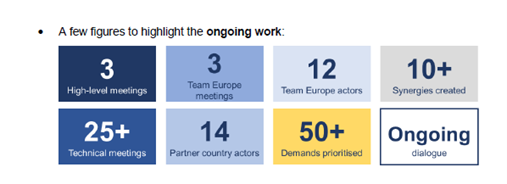-
08 April 2021
Category : Opinion
From ‘COVID-19 Round Tables’ to the ‘Team Europe Round Tables’
The current health crisis is also an opportunity to improve cooperation focused on public policy discussions. A dialogue based on shared values that leads to measurable results and builds fairer and more prosperous societies by focusing on matters like social cohesion, gender equality and the green agenda

COVID-19 has shown us that pandemics and their associated crises require rapid, coordinated and, above all, global responses to protect people and address the socioeconomic consequences being felt all over the world. Although the virus crosses borders, the unequal impact it has had on the population stands out.
These disparities are evident in multiple dimensions and areas: the risk of infection, access to education due to the digital gap, inequality in access to health services and the ability to work at home. This inequality has been particularly notable in some of our partner countries, especially in Latin America where the United Nations estimates that real GDP has decreased by 8% in 2020 due to prolonged national closures, weak exports and the demise of tourism, which has undermined economic activities1 .
In light of this, the European Union has reacted by redoubling its commitment to its partners. That’s why the Europe Team has been set up as a global response to the consequences of the pandemic in our partner countries, supporting and addressing key issues such as social cohesion, human rights, quality democracy, digitisation, gender equality and the environment.
It aims to assist in the global management of the crisis, providing a joint, organised and coordinated European response; combining efforts by the European Union and its Member States – including cooperation agencies – and development finance institutions.
In May 2020, following the “Working Better Together ” approach, the European Commission launched a pilot exercise called COVID19 Round Tables led by the Delegations of the European Union in Argentina, Costa Rica and Ecuador in collaboration with the governments of each of these three countries. This initiative works to identify the demands derived from the health emergency, in order to prioritise them in a joint exercise with the government of the partner country to channel the response of the European actors in a structured and coordinated manner according to the capacities and speciality of each actor.
Thanks to the close work carried out together with the focal points of each country, it has been possible to pool the efforts of relevant actors in the different facets and levels at which the devastating consequences of the pandemic have been felt.
The objective is to provide a joint EU response in the partner country, strengthening actions for socio-economic recovery, green recovery, digital and food security.
The implementing agencies of the member states, such as the International and Ibero-American Foundation for Public Administration and Policies (FIIAPP) are part of Team Europe. Thus, the FIIAPP offers technical assistance to the EU Delegations of Costa Rica and Ecuador, coordinating the pilot round tables in these two countries.
After several months of working together, the progress made is remarkable and the lessons learned are of great value. Throughout this process of dialogue, the focus has been on post-pandemic recovery and on rebuilding better, with an eye on the worst affected sectors and groups.
Through specific dialogue in each country, with flexible methodology and based on the reorientation of activities already underway in the Member States, EU cooperation agencies and programmes such as EUROsociAL + , EUROCLIMA + , EL PAcCTO, Bridging the Gap are achieving:
- Greater coordination and coherence in Team Europe’s response
- Appropriation by both European actors and the institutions of the partner countries. A great commitment is observed on the part of all the actors involved, recognising the added value of a sectoral, multi-actor and peer-to-peer dialogue.
- A deeper, mutual understanding of needs, demands, interests and of how we can respond. For example, it came to light that the Green Agenda, governance, digitalisation and inequality are important topics on the bilateral, regional and bi-regional agenda of Latin America and the Caribbean.

This joint response has led to the creation of Team Europe, making it possible to offer articulated, coordinated, coherent and flexible responses to urgent needs such as the one caused by the COVID-19 pandemic.
Team Europe is determined that nobody will be left behind, and international cooperation is more important than ever to its success. We are in an excellent position to strengthen bonds and share know-how and experiences that will be useful to all of us.
We have an opportunity to make progress, cooperating based on the values shared by both regions, transitioning towards real social cohesion, forming reliable democratic institutions to drive the digital revolution, gender equality and to give the Green Agenda the final push that it needs.
Perhaps we can transition from this pilot exercise focused on COVID-19 towards a working methodology and relationship model for European cooperation and partner countries: progress from COVID19 Round Tables to Team Europe Round Tables, making the “policy first” principle part of a structured mechanism for joint dialogue, implementation and partnership.
There’s no doubt that this is a difficult task, but it is one in which FIIAPP is determined to play a part.
Let’s keep building our future together.
Mariana Fernández, Management Support Unit at FIIAPP
The views and opinions expressed in this blog are the sole responsibility of the person who write them.






